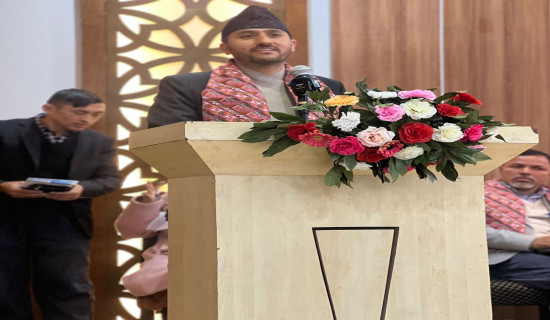- Wednesday, 24 December 2025
Development Roadmap
One day after a bureaucratic reshuffle, Prime Minister KP Sharma Oli has instructed secretaries to deliver good governance, effective public services and timely completion of development projects. While interacting with the top civil servants, the Prime Minister assured them of stability that is the key to the policy consistency, smooth functioning of the government and creation of favourable environment for business and economic growth. On July 15, Oli was appointed the new head of the government with support of the Nepali Congress (NC), the largest party in the parliament. The rationale behind forging the NC-UML alliance was to end the widespread despair gripping the people and lingering economic stagnation. Owing to the frequent changes of the guard, the confidence of bureaucracy, considered the permanent government, has nosedived. So PM Oli told the secretaries that his two-year tenure would remain smooth and he was committed to the agreement to hand over the premiership to NC president Sher Bahadur Deuba.
The PM asked the officials to work without fear but he laid it on the line: they should be result-oriented and precise in their goals and strategy. He also asked the ministers to come up with a sound progress report showing that they have accomplished the particular works in 100 days which would make the people believe that they have done something remarkable. The general public feels that the government is serious about their problems if they receive basic services hassle-free. However, the bureaucratic rigmarole has hampered them in getting their works done in the government offices. This is a reason why they have to be in a long queue to obtain the driving licenses, passports, the National Identity Cards and other documents. So Oli instructed them to provide these services to the people without delay.
One persistent economic dilemma is that the successive governments have been unable to spend more than 50 per cent development budget. On the other hand, it spends all recurrent expenditures. Low capital spending means big projects are not completed in time and jobs are not available in the labour market. So the Prime Minister drew the attention of the ministers and secretaries to end this situation. The government should clear the dues it owes to construction entrepreneurs and farmers. PM Oli has been calling for realising his motto - Prosperous Nepal, Happy Nepali. However, this requires clear plan for ending poverty and inequality. Still more than 20 per cent Nepalis are living under absolute poverty. They must be lifted out of poverty and their living standards must be raised. Increasing domestic productions and productivity should be the government priority.
Oli also instructed to organise Everest dialogue, resume the National Talent Award programme, address the complaints of businessmen not getting VAT refunds, complete the construction of the Dharahara as soon as possible and put it into operation, and stop all individual subsidy programmes but give continuity with the collective subsidy provided by the Ministry of Agriculture. Operating ships and trains is another agenda of the government. The civil servants often hesitate to take decisions related to financial matters for fear of being grilled by the anti-corruption agencies. In this regard, the PM noted that they should shed such mind-set and work with confidence. He also asked them not to take meeting allowances. As the present government was formed in specific situation, it must live up to the public expectations. For this, the PM's 25-point instructions serve as a roadmap of development, and the onus is on all the stakeholders to implement them without any excuses.

















